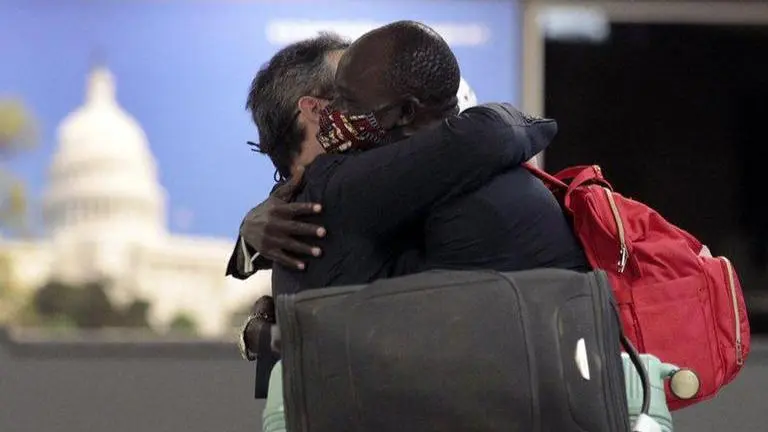Updated 24 July 2020 at 12:00 IST
South Sudan activist flees to US, says Kiir wanted him dead
A prominent South Sudanese activist has fled to the United States with the help of the U.S. government, which issued emergency visas to him and his family after he said South Sudan’s president ordered him abducted or killed.
- World News
- 4 min read

A prominent South Sudanese activist has fled to the United States with the help of the U.S. government, which issued emergency visas to him and his family after he said South Sudan’s president ordered him abducted or killed.
Peter Biar Ajak arrived in Washington late Thursday after weeks of hiding in Kenya and an anxious departure complicated by coronavirus restrictions.
“The last few weeks have been a bit terrifying. Extremely terrifying,” the 36-year-old activist told The Associated Press shortly after landing. It was only when the plane was taxiing for takeoff that he could feel relief.
Ajak, a Harvard graduate and economist who helped shape his young country’s national security system — one that imprisoned him years later — was tipped off by “very senior” officials back home, his lawyer Jared Genser said.
Advertisement
The emergency visas were “highly, highly, highly unusual,” Genser said, and involved discussions with the State Department, which decided the threat was credible. The State Department did not immediately comment.
“I knew this was no idle threat,” Ajak wrote in an opinion piece published in The Wall Street Journal after his arrival. “In January 2017, two other dissidents were abducted from Nairobi and murdered, leading the U.S. to impose sanctions on five South Sudanese officials.”
Advertisement
Ajak urged the U.S. to impose additional sanctions, including against South Sudan President Salva Kiir for his “cruelty.” The country has never had another leader, Ajak wrote, and the U.S. must insist on a path to elections or “the world will have squandered billions of dollars to create another African failed state led by a brutal dictator.”
Kiir’s press secretary, Ateny Wek Ateny, did not immediately respond to a request for comment.
Ajak now plans to resume his work and, if the chance arises, meet President Donald Trump to thank him for the pressure U.S. government officials have applied: “It would be my great honor.”
The drama reflects the plunge in U.S. confidence in South Sudan, the world’s youngest country, which won independence from Sudan in 2011 and massive support from Washington, including billions of dollars in aid. Now, however, after years of devastating civil war and corruption by high-ranking officials, the U.S. is losing its patience.
The latest U.S. action “speaks volumes about the enormous concerns Washington clearly has about what’s happening in South Sudan and the serious problems about President Kiir’s leadership,” Genser said, describing Ajak as “one of the most feared critics of Kiir’s regime.”
Ajak, a former refugee who went to the U.S. as a teen but later gave up his green card, played a key role as an adviser in shaping the new South Sudan’s national security structures. But he was fired after clashing with the official who now leads the National Security Service, Gen. Akol Koor Kuc, and became an outspoken government critic.
“We had a situation where anybody could arrest anybody,” Ajak once said.
In 2018 he was arrested as he tried to attend a youth conference. He later was was accused of inciting trouble behind bars. But early this year he was released along with other political prisoners as part of a peace deal ending the country’s five-year civil war.
The prison experience was “extremely harsh,” Ajak has said.
He was staying in neighboring Kenya when he was tipped off five weeks ago about the threat against his life. He went into hiding, emerging only for the required U.S. interviews and to pick up visas.
And then there was the pandemic. The family had venture out to a hospital for COVID-19 tests hours before departing on a rare charter flight, Genser said.
In the hospital parking lot, he said, was a vehicle with tinted windows and South Sudan license plates that had been spotted near Ajak’s building in recent days. The plates turned out to be unlisted in South Sudan’s registry, Genser said.
“I’m incredibly grateful to the U.S. for acting as expeditiously as feasible,” the lawyer said.
Ajak now plans to settle down and continue pressing for a “generational exit” of South Sudan’s leaders, with the help of the country's diaspora — and he didn't rule out the idea of pursuing South Sudan’s presidency himself.
Serving his country and advocating for his people has been a lifetime goal, he said. “Should that one day mean becoming president of South Sudan, so be it.”
The United Nations has warned the country is at risk of becoming a police state. Human rights are being trampled, and killing and intimidation are widespread, a U.N. commission warned in March. The need to swiftly implement the peace deal “has never been so urgent,” the U.N. secretary-general has said.
And yet Ajak is undoubtedly going back one day, Genser said: “He couldn’t imagine a world in which he couldn’t return.”
Published By : Associated Press Television News
Published On: 24 July 2020 at 12:00 IST
